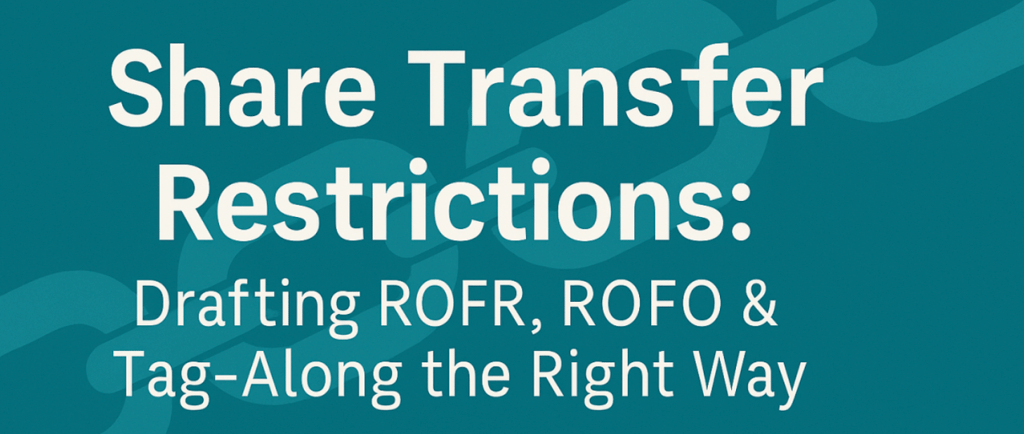Share Transfer Restrictions: Drafting ROFR, ROFO & Tag-Along the Right Way
10/24/20243 min read


Let’s be honest: Shareholder fallouts often begin with a transfer.
One founder exits. A co-founder wants to sell to a third party. An investor brings in a buyer. And suddenly, your cap table—and control—starts to shift.
That’s why share transfer restriction clauses like ROFR, ROFO, and Tag-Along aren’t “just standard terms.” They’re your safety net when things move fast—and if you’re not drafting them intentionally, you're leaving your startup exposed.
Why Share Transfer Restrictions Matter
When you issue equity, you’re not just giving ownership. You’re giving the right to transfer that ownership—and without restrictions, any shareholder can sell to anyone.
That can mean:
An outsider entering your boardroom
An investor buying without offering others a fair shot
A co-founder exiting, leaving you stuck with their stake
Clauses like ROFR, ROFO, and Tag-Along exist to manage this risk, preserve balance, and give other stakeholders a voice.
Let’s Break Down the Big Three (With Drafting Tips)
1. 🟩 ROFR – Right of First Refusal
What it means: If a shareholder wants to sell, they must first offer the same termsto the existing shareholders (or the company). Only if refused can they go to a third party.
Drafting Watchpoints:
Who has the right? (Promoters? Investors? Company?)
Does it apply to all transfers or just non-strategic ones?
How long does the offer window stay open? (Typically 15–30 days)
What happens if shareholders accept partially?
Use Case: Promoters want to maintain control over incoming shareholders. ROFR gives them veto power—without completely blocking exits.
2. ROFO – Right of First Offer
What it means: Before approaching outsiders, the seller must first offer to selltheir shares to existing shareholders—on terms to be negotiated.
ROFO vs ROFR? ROFO is more flexible, but less protective. The seller doesn't need to have a third-party offer in hand. The price is usually negotiable.
Drafting Tips:
Fix a time window for the ROFO negotiation (e.g., 15 days)
Include a fallback: What if parties don’t agree on price?
Define valuation benchmarks or escalation steps
Use Case: Useful in friendly co-founder arrangements where one may exit and prefers existing insiders, but still wants flexibility on price.
3. Tag-Along Right
What it means: If a majority shareholder is selling to a third party, minority holders can “tag along” and sell their shares on the same terms.
Why it matters: This protects minority shareholders from being left behind—or stuck with new majority owners they didn’t choose.
Drafting Points:
What % triggers Tag-Along? (e.g., selling 51% or more)
Are tag-along sales mandatory for the buyer?
Can the tagging shareholder insist on full or pro-rata participation?
Use Case: Investors or early employees want to exit when founders/investors exit—this ensures equal liquidity opportunities.
Bonus: Don’t Forget Drag-Along
While not a restriction, drag-along rights are the flip side: They allow majority shareholders to force minority shareholders to sell in the event of a strategic exit.
Helpful in acquisition scenarios. Risky if not properly limited.
Drafting caution: Limit drag-along to bonafide sale events, specify minimum IRR for investors, and include “good faith” conditions.
Drafting Checklist
Here’s what I include in founder-side reviews:
✅ Define who has the right—and who must comply
✅ Specify timelines and procedural steps (email notice, delivery, countersignatures)
✅ Align with the Companies Act & Articles of Association
✅ Match with SHA and cap table expectations
✅ Include conflict resolution (deadlock → arbitration)
Final Thought
Too often, founders see ROFR/ROFO/Tag as “standard investor boilerplate.” But when deals fall apart—or exits happen—these clauses decide who gets paid, who stays in power, and who walks away.
They’re not just legalese.
They’re strategic levers. And like every lever, they work best when drafted beforeyou need to pull them.
📩 If you’d like to review your shareholder agreement—or avoid getting boxed in during your next round—let’s connect.
#contractclarity #shareholderagreement #rofr #rofo #tagalong #startuplaw #founders #termSheet #vcdeals #corporatestructuring #legalstrategy #capTable